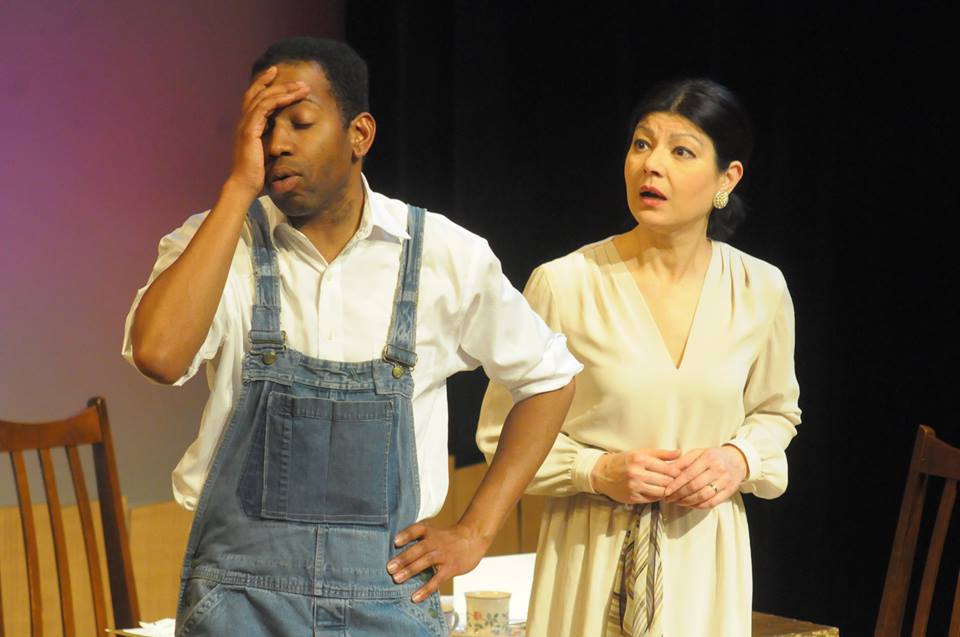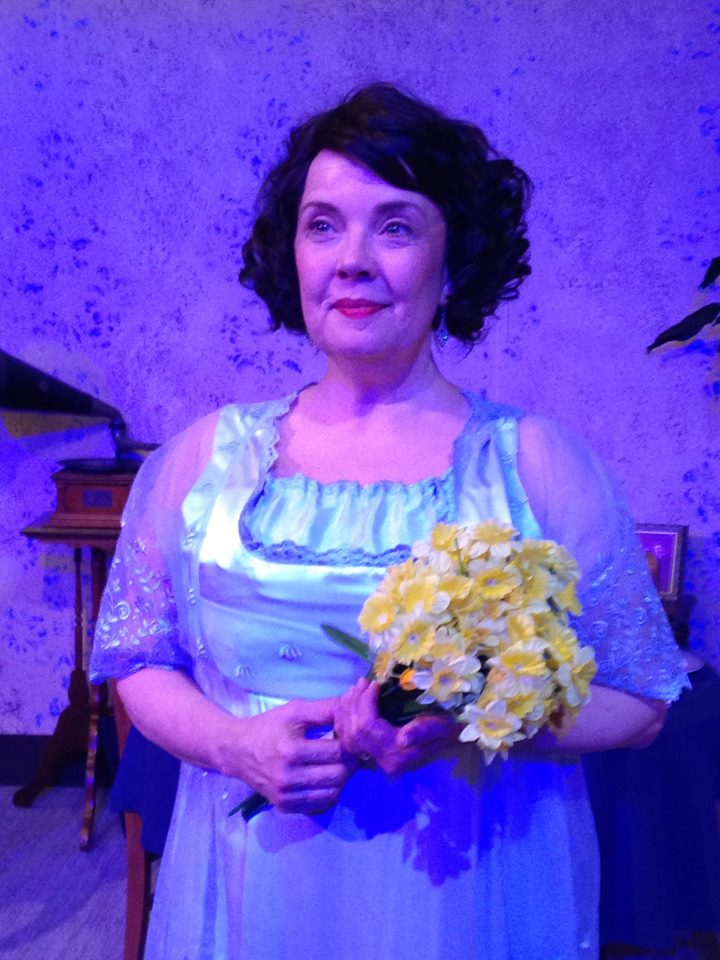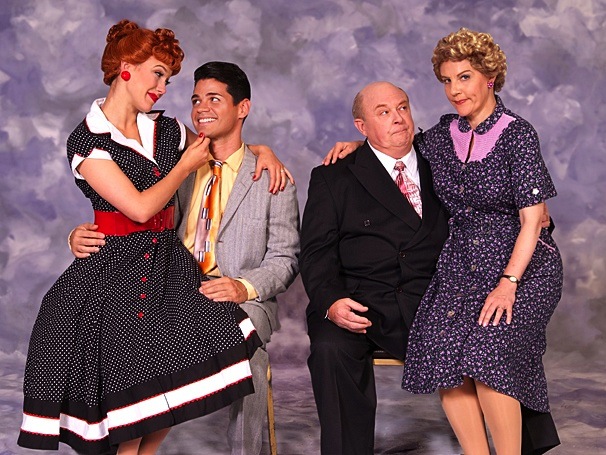Gary Brice & Samina Raza in Jockey Jim.
Photo by Bud Dorsey.
Jockey Jim
By Larry Muhammad
Directed by William P. Bradford II
Reviewed by Keith Waits
Entire contents copyright © 2016 by Keith Waits. All rights reserved.
When the Kentucky Derby rolls around, most theatres in the Louisville area close up shop, the assumption being that audiences will be otherwise occupied with Derby Festival events. So Kentucky Black Repertory bucks the odds with a new production of Jockey Jim, a play that ties into the history of “The Greatest Two Minutes in Sports.”
Jimmy Winkfield (1882 – 1974) was one of the great jockeys in thoroughbred racing, winning two consecutive Kentucky Derbies in 1901 and 1902. It is his journey after those victories, however, that is the compelling story of Larry Muhammad’s script: a lucrative career in Russia before and during the Bolshevik Revolution; a rich life in Paris with his wife, Lydie de Minkwitz; and an ignoble return to the United States, confronting Jim Crow segregation.
The structure of the play is roughly chronological, although some nonlinear juxtaposition early on felt confusing and seemed to lack any real purpose. The real draw of Winkfield’s story is that a sharecropper’s son became such a cosmopolitan figure, hobnobbing with celebrities and living on the periphery of pivotal moments in 20th century history. It is especially intriguing how Muhammad shows Winkfield’s complex relationships with Russians and Germans during the periods of great turmoil in those countries respective histories. Much is made of the contrast in attitude toward Negroes in Europe as opposed to America, although the Nazis are openly racist, just highly pragmatic about Winkfield’s usefulness.
The scenes that play best find Winkfield struggling with the latter part of his life in the United States. As the title character, Gary Brice is a young actor playing the aging horse expert with notable grace and care. He sidesteps cliché with wisdom and observation and establishes the character’s dignity with confidence. As Lydie, Samina Raza lends the Russian heiress a melodramatic quality that pushes the envelope a bit, but it is a quality that speaks to the character’s background and how emblematic it is of the peaks in Winkfield’s life in Europe.
Ernie Adams gives Winkfield’s employer, the casually racist Beauchamp, an easy, vile authority that still allows for some small but significant shifts in the audience’s perception of his character. Marcus Orton and Joe Monroe provide scene-stealing comic energy as two of Jimmy’s buddies — ne’er-do-well knuckleheads who do little to develop the plot but inject worthwhile color into the mostly sober-minded material. Francisco Juarez does a fine job as Milo, the Hispanic jockey who rides Winkfield’s horse in the 1950s. In its inclusion and treatment of this character, Muhammad’s text is fully aware of yet another shift in opportunities for minorities in thoroughbred racing.
Winkfield’s European adventures are generally more serious in tone, with a host of supporting characters who are notably less developed. Francis Whitaker and Spencer Korcz are professional as Russian compatriots, two limited roles that never rise above narrative necessity in the text. Better impact comes from a charismatic Sidney Edwards and Tyler Madden as Josephine Baker and Paul Robeson. These characters exist only as brief thumbnails of the iconic figures from Winkfield’s Paris life, but the actors occupy that territory with the presence and glamour befitting the two famed entertainers. In the same mold, Patrick Alred is miscast as an avuncular Bing Crosby, but he does yeoman’s work in this and other small roles. Tom Pettey wisely underplays Von Oppenheim, the German officer who is Winkfield’s contact, proving it is best to not push too hard when wearing a swastika on your arm. Tom Luce, Owen Kane, and Tim Stone fill out the ensemble with skill.
Jimmy Winkfield’s story is certainly worth exploring, and Mr. Muhammad works hard to investigate its social ramifications. Winkfield’s position as a man without a country is effectively mined to investigate the subversion of African-American history in the 20th century. Jockey Jim restores Winkfield to his rightful place in history.
Jockey Jim
| April 30, May 1-6, 8:00 pm
Tickets: $20 cash at the door |
Kentucky Black Repertory
at the Henry Clay Theatre
604 South Third Street
Louisville, KY 40203
502-727-7972
KYBlackRep@gmail.com
Keith Waits is a native of Louisville who works at Louisville Visual Art during the day, including being the host of PUBLIC on ARTxFM/WXOX-LP, but spends most of his evenings indulging his taste for theatre, music and visual arts. His work has appeared in Pure Uncut Candy, Theatre Louisville, and Louisville Mojo. He is now Managing Editor for Arts-Louisville.com.





